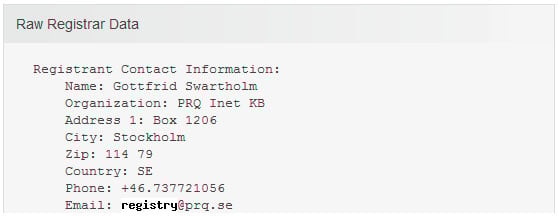Data published by Central Michigan University has revealed a worrying trend in copyright complaints. Out of 1,912 received so far in 2015, more than 80% were from Rightscorp, a company that demands cash to settle. The university’s chief information officer believes that campuses like his are being deliberately targeted.
Source: TorrentFreak, for the latest info on copyright, file-sharing, torrent sites and ANONYMOUS VPN services.
 Whether it’s a nice discount here and there or a straight-up freebie, cash-strapped students are happy to be front and center. No surprise then that they’re often associated with obtaining a little media from unauthorized sources too.
Whether it’s a nice discount here and there or a straight-up freebie, cash-strapped students are happy to be front and center. No surprise then that they’re often associated with obtaining a little media from unauthorized sources too.
As a result, in the middle of the last decade this penchant for lifting music from file-sharing networks grew into an international controversy when the RIAA forcefully targeted students with legal action. While it sent a message, it was also a PR disaster.
Almost a decade on and the landscape is somewhat changed, with official services now more cheaply available and often providing deep discounts for students. Nevertheless, students still like to download from P2P networks such as BitTorrent and today, just like a decade ago, they are getting caught in their thousands.
Data just released by Central Michigan University (CMU) shows that the number of copyright complaints received quadrupled between 2013 and 2014. But even with figures only available for the first 10 months of 2015, it’s already a record year.
As of the end of October, anti-piracy outfits had filed a total of 1,912 complaints at CMU. To put those numbers into perspective, CMU has around 20,000 students. However, it is the nature of the majority of those complaints that is most cause for concern.
While anti-piracy tracking companies such as IP-Echelon and MarkMonitor are contacting the university with their own DMCA-style ‘warning’ notices, the volume sent by them is being dwarfed by a company with a different agenda.
According to Mark Strandskov, associate director of the Office of Information Technology, piracy monetization company Rightscorp is now the dominant sender, accounting for more than eight out of every ten complaints received.
“You have agencies like Rightscorp where in the last two years account for over 2,500 complaints,” Strandskov told university publication CM-Life.
“They account for 81 percent of our total number of complaints this year and we didn’t receive anything at all from them two years ago. That sort of sticks out.”
In 2014 Rightscorp sent 899 complaints to CMU, around 65% of all complaints received. By the end of October 2015 the company had filed 1,648.
And, of course, for each of those notices Rightscorp demands cash. For example, Strandskov says that one student was asked to pay $30 after he allegedly downloaded The Lord of the Rings: Return of the King from Warner Bros.
But while these ‘fines’ are nothing out of the ordinary, vice president for information technology Roger Rehm says that he believes that outfits like Rightscorp are deliberately targeting educational establishments.
“The fact of the matter is (monitoring companies) have targeted university campuses,” Rehm says. “There is no question that they treat us differently than other networking organizations.”
While the sheer number of people on site will mean that universities and colleges receive a lot of complaints, the reason they are being targeted is likely to be connected to the RIAA’s actions last decade and the pressure subsequently placed on the government.
In July 2010, the U.S. responded by putting in place a new requirement for colleges and universities to take action against illegal file-sharing. Failure to do so can result in the loss of federal funding so little wonder that campuses view the issue seriously.
As a result, not passing on complaints from outfits like Rightscorp could have serious consequences for universities like CMU and it’s more than likely the company understands that. With this in mind, students are probably easy targets but whether they’ll bear fruit long term is up for debate.
While Rightscorp asks them for $30 per offense, CMU has much harsher punishments in store. According to CM-Life, a second infringement notice results in a $150 fine being imposed by the university and a potential Internet access suspension. A third offense warrants a $300 fine and even expulsion.
However, while it might be difficult to avoid being fined by the university itself following a complaint, not paying Rightscorp is an easier proposition.
“We’re in the business of passing the complaint along,” Rehm says. “We do not identify [students] to the company.”
Source: TorrentFreak, for the latest info on copyright, file-sharing, torrent sites and ANONYMOUS VPN services.

 For many years Sweden was viewed as a world leader in various file-sharing scenes, not least due to the prominence of The Pirate Bay.
For many years Sweden was viewed as a world leader in various file-sharing scenes, not least due to the prominence of The Pirate Bay.
 When it’s released on December 15, Star Wars: The Force Awakens is likely to become one of the most popular sci-fi films of all time. Even for non-fans, the anticipation can be felt around the entire web.
When it’s released on December 15, Star Wars: The Force Awakens is likely to become one of the most popular sci-fi films of all time. Even for non-fans, the anticipation can be felt around the entire web. Earlier this year the company behind the movie Dallas Buyers Club was
Earlier this year the company behind the movie Dallas Buyers Club was  In the early 2000s, international and Danish entertainment industry groups came together to tackle piracy of movies, music and other media.
In the early 2000s, international and Danish entertainment industry groups came together to tackle piracy of movies, music and other media. When one legitimately acquires property, whether a car, a house or even a toy plane, it’s generally accepted that the item can be transferred, for money, to an interested third party.
When one legitimately acquires property, whether a car, a house or even a toy plane, it’s generally accepted that the item can be transferred, for money, to an interested third party. While sites such as The Pirate Bay and KickassTorrents are viewed as the public face of large-scale file-sharing, hidden away behind passworded fronts lies the private tracker community.
While sites such as The Pirate Bay and KickassTorrents are viewed as the public face of large-scale file-sharing, hidden away behind passworded fronts lies the private tracker community.

 For millions of people around the world, Kodi – or XBMC as it used to be known – is one of the best pieces of software for viewing pirate content online. However, this capability is certainly not available ‘out of the box’.
For millions of people around the world, Kodi – or XBMC as it used to be known – is one of the best pieces of software for viewing pirate content online. However, this capability is certainly not available ‘out of the box’.
 In August 2015, BREIN
In August 2015, BREIN 

 While downloading content for later playback has been the mainstay of BitTorrent aficionados for well over a decade, streaming of content continues to gain popularity with many users.
While downloading content for later playback has been the mainstay of BitTorrent aficionados for well over a decade, streaming of content continues to gain popularity with many users. Whether it’s a nice discount here and there or a straight-up freebie, cash-strapped students are happy to be front and center. No surprise then that they’re often associated with obtaining a little media from unauthorized sources too.
Whether it’s a nice discount here and there or a straight-up freebie, cash-strapped students are happy to be front and center. No surprise then that they’re often associated with obtaining a little media from unauthorized sources too.